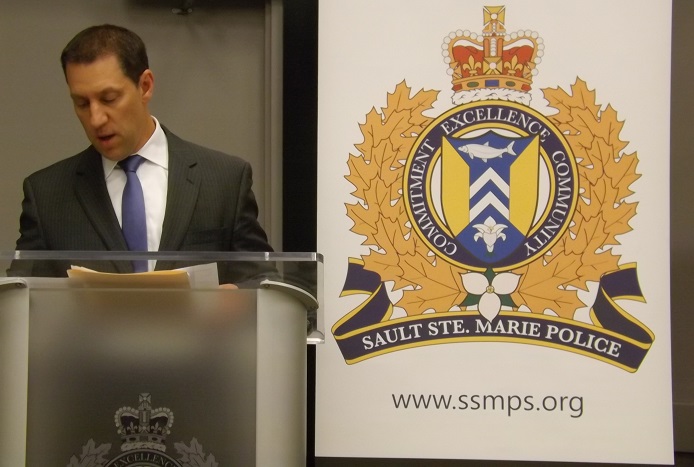They have witnessed all the ugliness a community offers. Gruesome murders, human loneliness, devastating poverty, men and women ravaged by addiction and unimaginable cruelty towards the most vulnerable members of society. They see what most of us never will. They take it all in, acquiring a severely clear view of the community they serve and unlike many of us, are unable to turn a blind eye to what they see. They are our sons and daughters, our brothers and sisters and our moms and dads. They are police officers.

In the classroom. Sault Ste. Marie Police work through scenarios enacting de-escalation strategies during a mental health crisis.
This week, 16 officers from the Sault Ste. Marie Police Services and one OPP officer and one Anishinabek Police Services officer, attended a crisis intervention workshop designed to assist officers in identifying signs that a person is experiencing a mental health crisis. The training provides frontline officers with the information required to recognize the unique mental health need of individuals and of the appropriate support services to direct the individual. During the training, officers participated in scenario play where de-escalation techniques were practiced to defuse the situation. The training intentionally focused on alternatives to the common use-of-force model conventionally taught to police recruits over several decades.
This training is part of a larger effort by Sault Police to address the changing demands of policing as seen across the province.
At a media event this week that dovetailed with the above mentioned training, Sault Police issued formal statements regarding the recent announcement that $100,000 in funding had been received through the Proceeds of Crime Grant delivered through the Ministry of Safety and Community Services (MSCS) for their Mobile Crisis Intervention Team pilot project (MCIT). The grant application was a combined effort among the Sault Police, Sault Area Hospital, Algoma Public Health and the Canadian Mental Health Association.
The project pairs two dedicated officers and a dedicated mental health worker from the Sault Area Hospital whose sole purpose will be to attend calls where a person is experiencing a mental health crisis. The MCIT pilot will launch during the second week of October.
Remarked Inspector Mike Kenopic, “This was an initiative that was the result of increased calls for mental health service within our community. Mental health calls have increased almost 100% within the last five years and another 15% this year. We have seen a need to address mental health crisis calls due to the high demand that’s been placed on police services, the hospital and other service agencies in our community.”
Inspector Kenopic explained that the MCIT initiative was launched back in November 2015 with the Sault Area Hospital. “Initial results from this initiative has shown a decrease in the number of individuals apprehended under the Mental Health Act and transported to the hospital. Wait times and demands within the emergency department have decreased as well and stigmatization for individuals suffering from mental illness has been reduced. This provides better police service within the community and increases collaboration between the police, the Sault Area Hospital and other health service agencies,” he commented.
MSCS Minister, David Orazietti, articulated that the rise in mental health calls to policing services is not unique to Sault Ste. Marie but endemic throughout the province.
“This issue across Ontario is rising and rising significantly,” stated the Minister. “The data suggests that this is a worthwhile endeavor. But this doesn’t happen in isolation. When you have individuals with complex needs and complex issues it isn’t often one agency that is going to solve the problem, so coming together as a community in a multi-agency approach is in fact the most effective and responsive. This is what makes a community come together and it says a lot about the leadership of the people here today and taking on this role.”
Constable Chris Kellar and Constable Mark Virtanen are the officers who composed the Proceeds of Crime application and designated as the officers dedicated to the MCIT.
Constable Kellar elaborated that a new way for officers to support members of the community who experience mental health issues is overdue. “This initiative is meant to divert people out of the hospital. We all know there are issues with the hospital in terms of bed shortages and wait times. And we know there are issues with police officers across the province who are experiencing the same thing. We keep going to similar calls with similar individuals and nothing really changes. The goal is to reduce wait times at the hospital, better care and support for people with a mental crisis and to keep them in our community. If we can assess someone in their home, not only is it more comfortable for that person but it gives us a good insight into how they are living –what’s their environment like, let’s talk to their neighbour or family members. Prior to this initiative we would pack them up and bring them to the hospital. We wouldn’t get that collateral information.”
MCSC Minister David Orazietti recognized that the MCIT initiative addresses concerns raised among Canadians and various experts about the use of force in policing.
Referencing the June 2016 report, A Matter of Life and Death, released by the Paul Dubé, Ontario Ombudsman, Orazietti expanded that policing demands have changed and therefore so must policing approaches. “The Ombudsman report is specific to the use of force in the police force. One of the key recommendations is changing the use of force model and this pilot helps officers who interact with mental health. The use of force model is an aspect of police training at the Ontario Police College and the Ombudsman pointed out that that model needed to be changed. That model is not necessarily reflective of the realities of policing today. This pilot fits well with that. At the Ontario Police College we have already acted on some of the recommendations from the Ombudsman and we are training and ramping up their de-escalation training at the Ontario Police College.”
The Ombudsman report issued 21 recommendations all of which were accepted and will be implemented. Recommendations include:
*The Ministry of Community Safety and Correctional Services should institute a new use of force model that is easy to understand and clearly identifies de-escalation options, rather than just use of force options. Given the urgency of this issue, a new model should be developed and rolled out to all police services as quickly as possible and no later than 12 months after the publication of this report.
*The Ministry of Community Safety and Correctional Services should use the expanded Ontario Police College curriculum to offer more training on mental illness, and strategies to de-escalate situations involving persons in crisis.
*The Ministry of Community Safety and Correctional Services should work with the Ministry of the Attorney General and the Special Investigations Unit to analyze information collected in SIU investigations into incidents involving the death or serious injury of persons perceived to be suffering with mental illness or who are otherwise in crisis, and incorporate relevant lessons into the police training process.
But the Ombudsman also issued a caution, expanding on the need to transform a policing ethos entrenched in antiquated practices and beliefs. Under the heading Changing Police Culture, Dube writes:
Expanding de-escalation, enriching it with scenarios and ensuring consistent training across the province would be welcome improvements on the Ministry’s part, but they can only go so far. The underlying issue that must also be addressed, according to the families, interest groups, academics, police trainers and many others our Office interviewed in the policing community, is a culture that tends to regard fatal interactions with persons in crisis as unfortunate but unavoidable. Some families of victims described this as an “us-versus-them” mentality that leads to stereotypes of persons with mental illness and exaggeration of the threat they pose to police and the public in crisis situations. A retired police chief said this becomes entrenched in part by police associations and in-service training that “create a culture that around every corner there’s a guy waiting to kill you, waiting to shoot you.”
Referencing an independent review, Police Encounters With People in Crisis, a critical evaluation of Toronto Police Services (TPS) undertaken by the Honourable Frank Iacobucci at the request of TPS Chief of Police, William Blair, following the death of Sammy Yatim, the Ombudsman articulated:
Other cultural issues cited by Justice Iacobucci include the police paramilitary structure that makes it difficult for lower-ranking officers to speak out or push for change, an emphasis on “forceful responses – asserting and maintaining control over every situation,” a general stigma surrounding mental illness, and a feeling among officers that responding to calls about emotionally disturbed persons is not “real” police work.
But Constable Kellar stated that he has observed a desire for change among the ‘seasoned’ members of Sault Ste. Marie Police Services that have been doing it the traditional way for decades. “We have new officers coming in. They are just through high school and university and younger generations have been exposed to information about mental health. Looking back at the media over the past 10 years we have begun talking more openly about mental health issues and how to get help. A lot of senior officers have said that they wish this had been in place years ago. They’ve noticed a need for it, they see a benefit for it.”
Constable Kellar isn’t just talking about the mental health needs of community members police encounter but of the mental health needs of police officers too.
Among Iacobucci’s 84 recommendations is the call for the support and greater understanding of workplace trauma –like mental injuries, that officers acquire on the beat:
*Focus on the need to develop wellness strategies, policies and procedures for police officers that are respectful of the stresses and potential to mental injury on the job.
Cops, like all first responders, are subject to the stereotypes of the general public. These men and women are differentiated from the mainstream by their courage to run towards danger when most are running from it. However, that is where the distinction ends.
“Typically policing is ‘take that call and dust yourself off and go on to the next call’,” admitted Constable Kellar. “That’s the nature of it. And you can go from one extreme to the next without taking care of yourself in between. The perception is that you’re a police officer and you signed up for the job and things shouldn’t bother you. Well, police officers are just like any other individual in society. Things tend to affect people.”
Creating safe places, especially in the workplace, where police officers can disclose stressful or traumatic experiences on the job without being perceived as inadequate or weak will be an important step in challenging the stigma that exists around mental injuries, such as PTSD, anxiety or depression, that have been acquired while on the job. Sault Ste. Marie Police Services have undertaken measures to address these concerns.
Constable Kellar was one of two officers that received training that allowed them to facilitate a workshop called Road to Mental Readiness. Local officers received training this winter and spring that is designed not only to support officers in recognizing their own mental health needs but to reduce the stigma around acknowledging those needs and asking for help.
Remarked Constable Kellar, “We are people. As frontline workers we are exposed to a multitude of things that the everyday citizen will never see in their career or lifetime. This program really demonstrated how to take care of yourself as an officer, where to go for help, that it’s ok to ask for help, it’s ok to see a psychologist. Going in to see your counsellor or psychologist should be as common as going to your general practitioner. It’s never too late to start taking care of that stuff but if you don’t start taking care of that early on in our career it just continues to pile up. We really try to instill in people that self-care is significantly important in staying healthy not only on the job but in your personal life too.”
It is interesting to note that Iacobucci’s recommendations also includes that:
Preference or significant weight be given to new police recruits who: engage in significant community service with exposure to crisis; have experience with mental health, be it direct personal experience with family members or work in a hospital, community service; and possess higher education where post-secondary education is completed or substantially equivalent education.
Hired in 2014, Constable Kellar has only been with Sault Ste. Marie Police Services for two years. Upon graduating with a Bachelor of Arts in Criminology, Chris Kellar was hired in 2006 by the Canadian Mental Health Association in the Sault where he worked as a Court Outreach counsellor. He remained in that position until 2014 when he was hired by Sault Ste. Marie Police Services.
“I always had an interest in the criminal justice system. I never really had the idea of intertwining this all together- criminal justice, mental health and policing, it just kind of fell into place,” shared Constable Kellar.
Constable Kellar’s previous career experience has equipped him with a unique set of skills and experiences that compliment his work as a police officer in the community. “I think the big piece is that I’ve been exposed to so many situations that were mental health related, so I’ve been able to bring in that skill set in regards to a good knowledge base of mental health issues and also how to interact with people with mental health issues. And also knowing what community based services are available to those individuals.”
MCSC Minister David Orazietti broadly acknowledged that the province has acknowledged a need to crack open and overhaul the Police Services Act. On the recruitment of individuals into policing who have educational backgrounds in mental health services or other related fields Orazietti provided, “The Police Services Act is almost 30 years old. Opening the Act is part of our responsibilities and inside that are a number of areas that we are committed to reviewing and that will be part of it. I don’t have the fine details of what we will be looking for yet but we know we will be making changes.”





